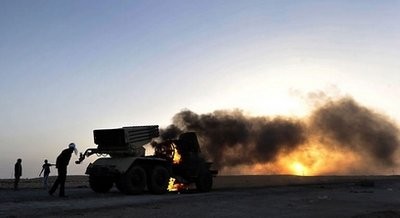HARAWA, Libya (AFP) – Libyan rebels were stopped in their tracks on Monday as forces loyal to Moamer Kadhafi launched a fierce attack on their convoy, halting their push forward to Sirte for a second time in the day.
Coalition warplanes were again in action after darkness fell, bombing regime targets on the central coast and in the west, but US officials denied that the military action was intended directly to help the rebels.

British Prime Minister David Cameron told the leaders of the United States, Germany and France that a planned conference on on Libya in London on Tuesday should "broaden the coalition" of nations committed to enforcing a UN Security Council resolution allowing the use of force to protect civilians.
The rebels came under heavy fire at the village of Harawa, some 60 kilometres (35 miles) short of Kadhafi's birthplace.
French journalists at the scene, who escaped unhurt, reported at least two casualties and several rebel pick-up trucks destroyed in the assault.
Artillery fire continued for half-an-hour, the journalists said, halting the rebels' progress.
After their rapid progress on Sunday, helped by overnight coalition air raids, Monday proved something of a sticking point and earlier in the day, their advance westwards towards Tripoli was halted about 140 kilometres (85 miles) east of Sirte but later resumed.
Ahead of an international conference in London on Tuesday, Britain and France called for supporters of the Libyan leader to abandon him "before it's too late" and insisted the rebel National Transitional Council should help a Libyan transition towards democracy, saying Kadhafi must go immediately.
Italian Foreign Minister Franco Frattini, whose country was the former colonial power in Libya, said he expected it to be liberated quickly."
Forces loyal to Kadhafi have ended their onslaught on rebel-held Misrata and "calm" has been restored, the foreign ministry announced, without clearly indicating whether the town was back under loyalist control.
Opposition representatives in Benghazi, meanwhile, were trying to form a government-in-waiting.
At present, the official voice of Libya's opposition rests with the so-called Provisional Transitional National Council (PTNC), a group of 31 members representing the country's major cities and towns.
Life returned to something like normal in Benghazi but the insurgents say it will not become the capital of a rebel state -- their aim is to take Tripoli and rule over a unified, post-Kadhafi Libya.
On Sunday, the rebels had seized Bin Jawad after retaking the key oil town of Ras Lanuf as they advanced with the support of coalition air strikes on Kadhafi's forces.
But on Monday they came under heavy machine-gun fire from regime loyalists in pick-up trucks on the road from Bin Jawad to Nofilia.
The insurgents pulled back into Bin Jawad and opened up with heavy artillery.
Pick-ups flying the green flag of Tripoli and mounted with heavy machine guns opened up on the rebels who replied with multiple rocket launchers and cannon fire.
A 10-minute incoming artillery barrage panicked the thousand or so rebels along the road outside Bin Jawad, sending them fleeing in disorder.
"It won't be as easy as we thought to take Sirte and then march on Tripoli," said 20-year-old rebel fighter Ahmad al-Badri, wearing incomplete battledress and clutching an old Kalashnikov.
"But we won't stop -- we'll advance. They can't hold us up for long," Badri added.
All of the rebel fighters who spoke to AFP expressed confidence that coalition warplanes would reopen the road to Sirte for them, but the Pentagon insisted the aim of the mission was not to aid the rebels.
"We're not in direct support of the opposition, that's not part of our mandate and we're not coordinating with the opposition," US Vice Admiral Bill Gortney, director of the US military's Joint Staff, said.
NATO has finally taken over enforcing a no-fly zone and flew its first enforcement mission over Libya on Sunday in the operation codenamed "Unified Protector".
Officials cautioned, however, that the transfer of command would take 48 to 72 hours.
"Our goal is to protect civilians and civilian-populated areas under threat of attack from the Kadhafi regime," said NATO Secretary General Anders Fogh Rasmussen.
"NATO will implement all aspects of the UN resolution. Nothing more, nothing less," he said.
The command transfer came as Tripoli also came under attack by what state television called "the colonial aggressor".
Foreign Minister Mussa Kussa was in neighbouring Tunisia on what state media described as a "private visit," insisting he would have no contact with representatives of the new government of the first country to be transformed by the wave of popular protests sweeping the Arab world.
Qatar became the second nation, after France, to recognise the PTNC as the "sole legitimate representative" of the Libyan people, the Gulf state's QNA state news agency said.
Of the 31 PTNC members, the names of only 13 have been publicly revealed. Council spokesmen say it is still too dangerous to identify members in areas still controlled by Kadhafi.
Ali Tarhoni, the rebel representative responsible for economy, finance and oil, said on Sunday that the provisional government was already producing oil from fields under its control and had reached an agreement to export it under Qatari auspices.
"We are producing about 100,000 to 130,000 barrels a day, we can easily up that to about 300,000 a day," Tarhoni told a news conference.
Oil prices fell as traders eyed the possible resumption of exports from rebel-held territories.
New York's main contract, light sweet crude for May, settled at $103.98 a barrel, a decline of $1.42 from Friday's closing level.
In London, Brent North Sea crude for delivery in May shed 79 cents to close at $114.80 a barrel.
























